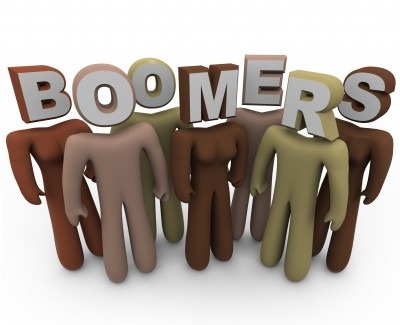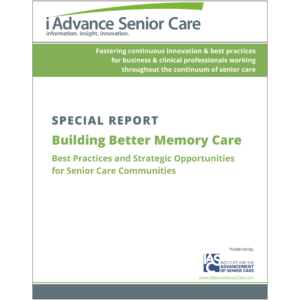10 anticipated psychosocial needs of baby boomers
We’ve heard the rumblings of the coming generation in the voices of our “young” residents in their 50s and 60s. It’s the younger residents who most often chafe at the restrictions of nursing home life, such as being unable to leave the facility unsupervised, or being cautioned to sit when they’d prefer to walk and take the risk of falling. As the baby boomers enter long-term care in greater numbers, those rumblings will grow louder, necessitating changes in how we deliver care. We’ll be more successful in making these changes if we anticipate the needs of the boomers, rather than merely reacting to their dissatisfaction.
Attending to their psychosocial needs will help your boomers find comfort, enjoyment and purpose in their later years, thereby creating vital, thriving organizations better able to adapt to changes in the long-term care landscape. Here’s what to look out for, and what you can do to help your organization and your residents.
1. Social connectedness
Internet access keeps boomer residents in touch with their social networks as well as the rest of the world. The next generation of residents will expect to be wired, so make your long-term care facility a hotspot now. To increase the value of this service, add adaptive equipment, along with training in how to use it, lockable laptop drawers, additional electrical outlets and policies on maintaining privacy in the nursing home.
2. Social differentiation
Say good-bye to “Goodnight, Irene” and hello to “You Can’t Always Get What You Want”, “Are You Lonesome Tonight?” and “Soldier Boy”. The universal music of earlier generations shifted toward more individualized preferences in our new cohort, so plan on mixing your Motown with your Hendrix nights. Our boomers also had exposure to a wide variety of ethnic foods during their lifetimes. Consider polling residents to discover their preferences and offering an international option on your menu for greater variety and the opportunity for personal growth.
 3. A platform for change
3. A platform for change
The activist generation doesn’t believe that “the doctor knows best.” This is a group of people used to fighting for their rights. Anticipate stronger resident councils looking to create concrete, positive change within your organization. Harnessing this power could be the best thing to ever happen to your community, because the residents will point to the changes you need to make to stay viable—the changes your line staff see but are afraid to tell you about. Give residents, and the staff members working with them, the tools to make it happen.
4. Consumer impulse
“‘Consumerism Clashes with Measly Personal Needs Allowance’—story at 11.” You can just envision the broadcast, right? It would go something like this:
“In today’s news, a growing mob of elders in nursing homes across the country took to the Internet in protest of the PNA, which hasn’t been increased since 1980. Here, a word from their leader, Ima Believer: ‘We want an inflation adjustment! We want to have a place to buy things ourselves instead of having to rely on the kindness of strangers! We want debit cards linked to our accounts here at the home!’”
 5. Continuing education
5. Continuing education
Opportunities for education can boost self-esteem and also create social connections. Boomers will be more likely to expect activities that provide possibilities for personal growth, such as classes on popular topics (like psychology) or activities that allow them to contribute to society. Take, for example, a bake sale to raise money for charity.
6. The boomer is always right
The service economy has made its mark on our upcoming group of residents. If a request for toileting is met with the often-overheard staff response, “Again?!” the boomer resident is far more likely to head over to the office of the Director of Nursing than to respond with the shamed silence or quiet seething of our current cohort of residents. Train your staff now on customer service techniques, walk the floors on a regular basis listening to their interactions and then train your staff again. Model appropriate behavior by speaking to staff members in the manner in which you want them to talk to residents.
7. Sex
Establish policies around sexual interactions, have your psychiatrists ready to evaluate for capacity to consent, be prepared to discuss new relationships with family members—and get your multi-purpose room ready, because baby boomers are more likely than our current group of residents to expect to exercise their sexual freedom. Rehab referrals for this activity of daily living and requests for erectile dysfunction medication will become more common. Staff training will help your team handle residents’ sexual concerns in a helpful and professional manner.
8. Fashion and décor
Floral back snap dresses with petal collars and sweatshirts with cute puppy prints will need to make way for more fashion-forward clothing designs that enhance the esteem of residents. And expect conservative room décor to be “tweaked” by younger residents. To make everyone happy, create a way for these adjustments to occur without destroying property, such as a system for easily changing artwork without putting holes in the walls. For example, consider adding molding close to the ceiling so that pictures can be hung with hooks or wires and no commitment. Or offer a variety of coordinated privacy curtains.
 |
| "Who are these people, and why do they seem so demanding?" |
9. Scheduling daily priorities
Personal choice is important to boomer residents, making them more likely to demand flexible scheduling options than our current population. Imagine how empowered and cooperative residents would be if they had the opportunity to outline their schedules. “I’d like my wake-up call at 7 a.m., my breakfast between 7:30 and 8 a.m., and my rehab at 9 a.m.” If we can work the nursing home schedule around the needs of the residents, rather than the residents around the needs of the nursing home, long-term care will become more livable.
10. Emotional support
Ageism among a group of residents that grew up with the rock and roll anthem lyric, “I hope I die before I get old,” is likely to lead to challenges in self-concept for this generation. Support services, whether through individual psychotherapy or groups such as Alcoholics Anonymous or other illness-related organizations, will be expected by baby boomers, who are more aware of the mind-body connection and more comfortable sharing their concerns than our current residents.
Eleanor Feldman Barbera, PhD, is an author, speaker and consultant on psychological issues in long-term care. For more information, visit Dr. Barbera's website, www.mybetternursinghome.com.
I Advance Senior Care is the industry-leading source for practical, in-depth, business-building, and resident care information for owners, executives, administrators, and directors of nursing at assisted living communities, skilled nursing facilities, post-acute facilities, and continuing care retirement communities. The I Advance Senior Care editorial team and industry experts provide market analysis, strategic direction, policy commentary, clinical best-practices, business management, and technology breakthroughs.
I Advance Senior Care is part of the Institute for the Advancement of Senior Care and published by Plain-English Health Care.
Related Articles
Topics: Activities , Articles , Staffing











